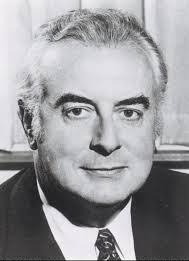 The death today of former Prime Minister Mr Gough Whitlam, AC, QC, triggered national reflection on the life and contribution of a significant Australian political figure.
The death today of former Prime Minister Mr Gough Whitlam, AC, QC, triggered national reflection on the life and contribution of a significant Australian political figure.
Mr Whitlam was born in Melbourne on 11 July 1916 and was elected to the federal parliament in 1952. He led the Australian Labor Party from 1967 to 1977, and was Prime Minister from 5 December 1972 until his government was famously dismissed in controversial circumstances on 11 November 1975.
Associate Professor Dominic O'Sullivan, associate professor in politics at the CSU School of Humanities and Social Sciences in Bathurst, remembers Whitlam's legacy as much more than the chaos and crisis surrounding the dismissal of his Government in 1975.
"Whitlam fundamentally changed Australia," Professor O'Sullivan said. "He was a leader of extraordinary intellectual energy, and as the first Labor Prime Minister in more than 20 years he brought a particular urgency to government. Within days, the highly controversial conscription policy was ended and, over time, free tertiary education introduced, state aid to private schools extended, the forerunner to the present Medicare established, and the ground laid for Aboriginal land rights.
"The Whitlam Government asserted Australia's independence and challenged the imperial association with Britain. The removal of knighthoods and God Save the Queen, and patronage of the arts and literature suggested new ways of Australia thinking about itself as a nation.
"On the other hand, its mishandling of the oil shock in 1973, and inability to manage scandal and incompetence within the government meant that its Budget was not passed by the Senate and its record of poor economic management overshadowed the constitutional outrage that many people felt as the 1975 election campaign progressed.
"So Whitlam's is a two-fold legacy – reforming zeal, on the one hand, and unmanageable crisis on the other", Professor O'Sullivan said.
Adjunct Professor Bruce Pennay from the CSU School of Environmental Sciences in Albury-Wodonga says Mr Whitlam's plan for a National Growth Centre in Albury-Wodonga was hailed as novel, experimental and imaginative.
"It was 'a pilot scheme' which involved three governments entering on an 'exciting adventure' in cooperative federalism," Professor Pennay said. "It was a 'brave attempt' to solve a long-standing problem and a 'bold venture' in selective decentralisation expected to influence the urban settlement pattern in Australia. The vision was great, but the plans proved difficult to realise as the Whitlam Government was so short-lived.
"Whitlam was personally responsible for imagining the rapid and joint development of Albury-Wodonga. He remained an enthusiast and would visit from time to time to hail in endeavours to promote the two cities as one and to upbraid those who set them apart. He was pleased to see that many of the suburbs continued to show their beginnings along the latest New City town planning guidelines. He was proud of the way the district grew as a manufacturing and distribution point. And he would smile quietly at the recognition that even though Albury-Wodonga never reached his population target, it is still ranked in the largest twenty urban cities in Australia.
"An early champion of a University of Albury-Wodonga, Whitlam thought it ironic that two universities, one in Albury and the other in Wodonga, endowed him and his colleague Mr Tom Uren separately with honorary degrees for their joint project," Professor Pennay said.
Mr Whitlam was also renowned for his pithy wit. Later in life, reflecting on his first days in government in 1972 before a full Cabinet was sworn in, Mr Whitlam opined that his two-man government (with Mr Lance Barnard) was the best he led, " ... even if it was too big by half". Upon his government's dismissal in November 1975 by the then-Governor General, Sir John Kerr, he famously decreed with a theatrically deadpan deliver from the steps of the Old Parliament House to an agitated crowd, "Well may we say 'God save the Queen', (pause) because nothing will save the Governor General". He also subsequently referred to Liberal Prime Minister Mr Malcolm Fraser who replaced him, as "Kerr's cur".
Mr Whitlam is Australia's longest-lived Prime Minister. He married Margaret Dovey (born1919, died 2012) in April 1942 and is survived by their four children, Anthony, Nicholas, Stephen, and Catherine.





Social
Explore the world of social